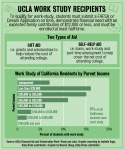This post was updated Mar. 6 at 3:44 p.m.
A federal proposal governing work-study programs may reduce funding to University of California students, a UC official said.
The Promoting Real Opportunity, Success, and Prosperity through Education Reform Act, which was introduced in the House of Representatives last month, would revise the Federal Work-Study formula to distribute funds to universities on the basis of how many Pell Grant recipients and undergraduate students with financial need they enroll, according to the American Council of Education. The act would also reserve funds for colleges and universities in the top 10 percent of completion or graduation rates, as well as institutions that raised those rates over the course of a year.
Chris Harrington, UC interim associate vice president of federal governmental relations, said the plan could take away funding from UC campuses. Federal Work-Study provides funds for part-time jobs for students while they are enrolled in school. More than 13,000 UC students received nearly $26 million in Federal Work-Study funds in the 2016-2017 academic year, according to Harrington.
Harrington said although the UC agrees with the proposal’s efforts to make access to aid more equitable, changes in the formula could require many of those students to take out private loans, he said.
“If these students do not have access to federal loans … they would be forced to seek out private loans, which do not offer the same consumer protections,” he said.
Harrington added no graduate students would receive Federal Work-Study funding if the PROSPER Act passes. He said about 800 UC graduate students received $3 million in the 2016-2017 academic year.
Several higher education experts said they think the proposal would actually benefit students with greater financial need.
Antoinette Flores, a senior policy analyst at the left-leaning Center for American Progress, said the current work-study program prioritizes funding for elite colleges, like Ivy League schools. This means the program’s funding often goes to students with less financial need, she said.
“Today, Federal Work-Study dollars are dished out in an antiquated formula that prioritizes institutions over students,” Flores said.
Reid Setzer, the government affairs director at Young Invincibles, a nonprofit organization that advocates for economic opportunities for youth, said while the organization does not support the PROSPER Act as a whole, they think the proposed work-study formula makes the program more equitable.
He said because the formula provides more funding to institutions with larger numbers of Pell Grant recipients, it could ensure that low-income students are able to get work-study jobs.
Setzer said the proposal could also provide students with higher quality jobs that give students useful work experience.
Harrington said the UC system plans to lobby lawmakers to make sure work-study funds to the UC are protected.
“The (UC) is working with members of Congress to highlight the importance of the Federal Work-Study program and to ensure it is … adequately funded,” he said.

As long
graduate and professional students are allowed to borrow taxpayer money to
attend any accredited institution at any price, regardless of the quality of
the degree or certification, the unacceptable and dangerous $1.4 trillion student
debt will continue to increase, college costs will continue increase, and
student success rates will decrease.
A good piece Julia, but here’s something everyone needs to think about—especially Congress:
For many years now the Grad PLUS loan program has been artificially boosting demand for student loans, thereby increasing college costs. By coupling Grad PLUS loans with loan forgiveness and multiple repayment plans, the federal government has unequivocally encouraged over-borrowing which frees schools from their responsibly to charge prices that actually reflect the market value of their graduate degrees and professional certifications.
The irony of the Grad PLUS loan program is that it charges borrowers more relative to the risks that they pose, and exposes unacceptable losses to taxpayers due to projected costs of loan forgiveness, multiple repayment plan options, and other policies – policies originally intended to serve needy undergraduate students.
Clearly, the imperfections in the graduate and professional student loan market that would constitute the only legitimate reason why the federal government should be involved in this market do not exist.
By eliminating federal student loans for all but the neediest of economically disadvantaged graduate and professional students, Congress can: (1) provide more funding for undergraduate education; (2) help bring down college costs; (3) incentivize schools to price their graduate and professional programs according to their market value; (4) enable graduate and professional students to better assess the market value of their chosen programs before attending school; and (5) restore greater private sector participation in graduate education finance and foster innovative private lending options.